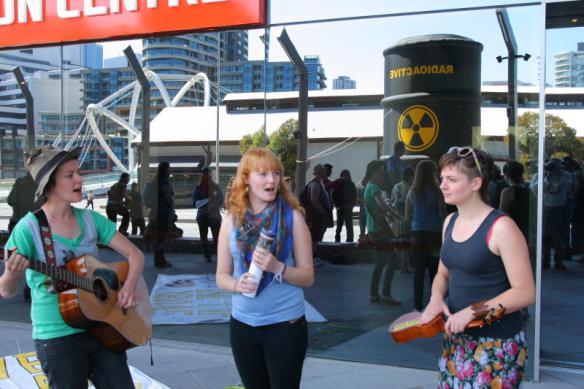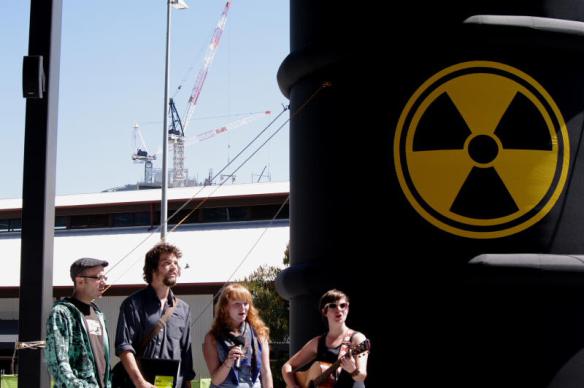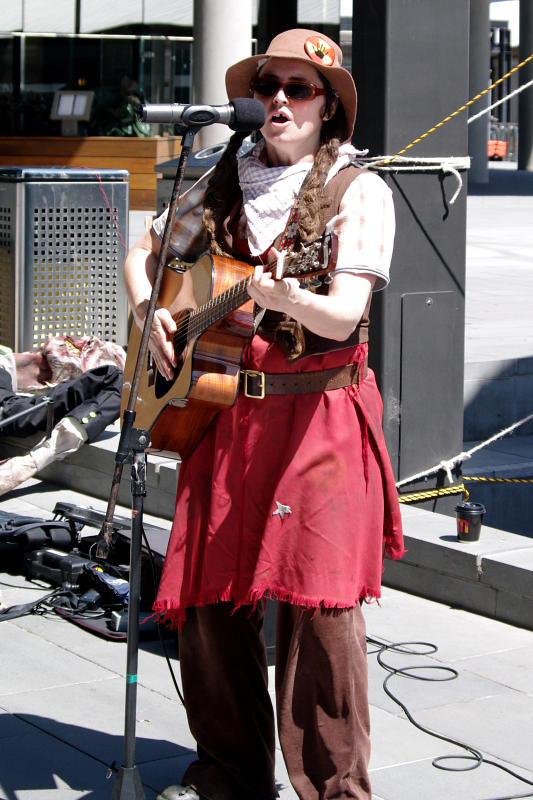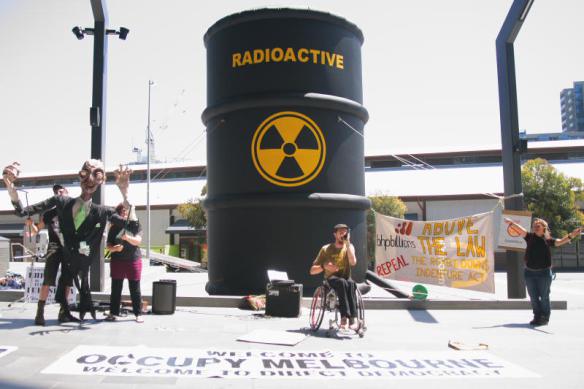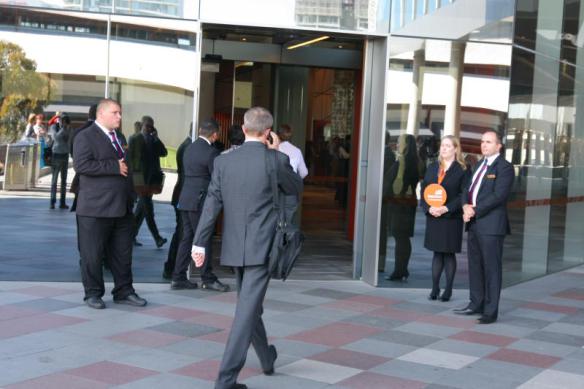“Normal service will be resumed as soon as possible”
Monthly Archives: November 2011
Protest at BHP Billiton AGM, Melbourne Conventions Centre, 17 November 2011
Traditional owners and environmentalists descended on the Melbourne Convention Centre for the BHP Billiton AGM. Using proxies, some twenty Aboriginal elders and supporters gained access to the meeting, while others held a protest outside. Friends of the Earth and a collective of environment groups had prepared an ‘alternative’ annual report for the world’s biggest mining company, and copies were handed to shareholders – see BHP Billiton Watch where the report is available for download. The protest, against a backdrop of a giant inflatable radioactive waste drum and Mr Death puppet, was joined by members of Japanese for Peace, and was enlivened by music from the Radical Choir, hip-hop activists MC Ollie and Izzy, plus a visit from No Nuke Calamity Jane (aka Madeline Hudson):
Elders gathering before entering the Centre:
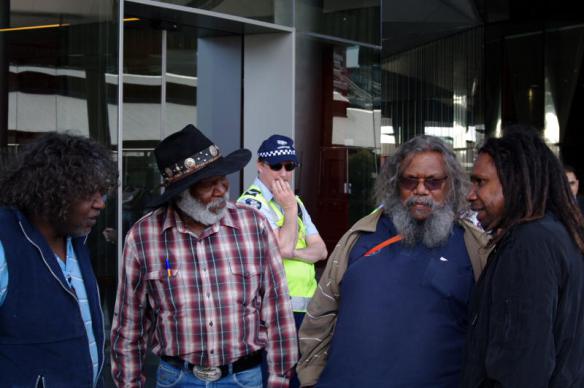
`
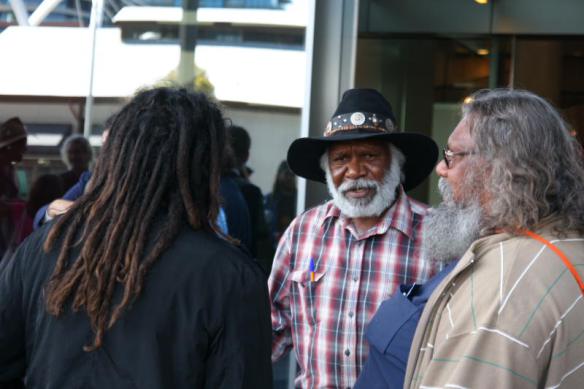
`
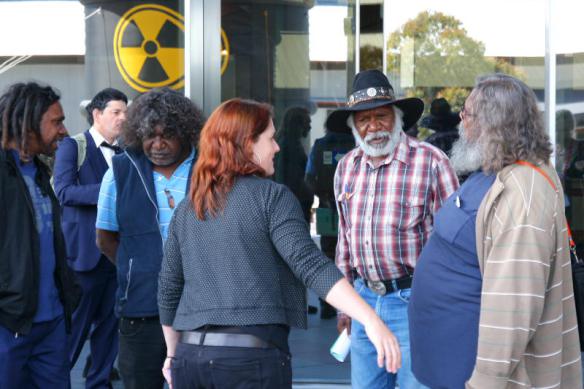
`
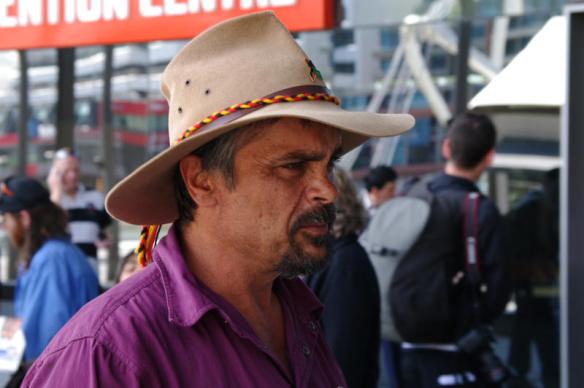
`
Lining up for the cameras before going in:
`
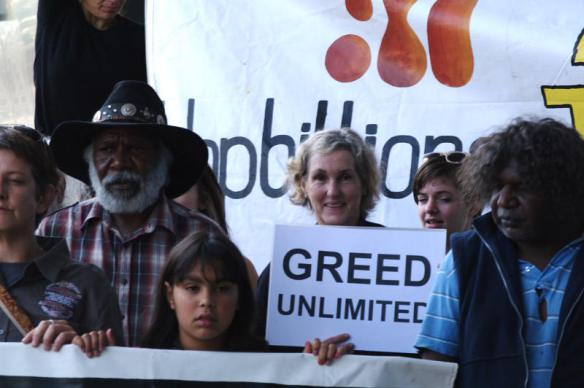
`
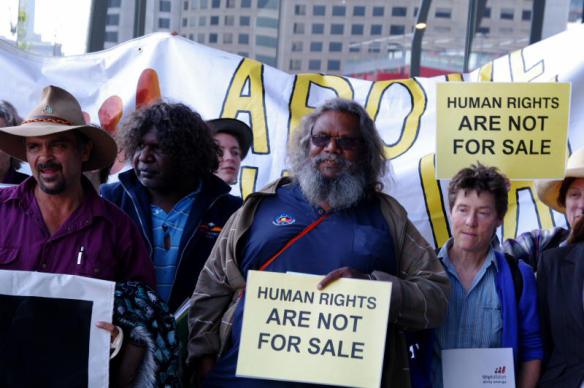
`
Heading in:
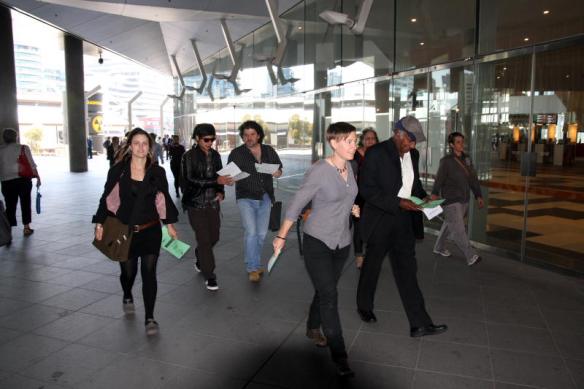
`
Security at the immediate entrances to the Convention Centre was strict, though the initial strong police presence soon dwindled, and papers were carefully checked before some people were allowed in; others were apparently exempt from this…
`
Uncle Kevin’s credentials checked:
`

`
Same for Peter Watts:
`
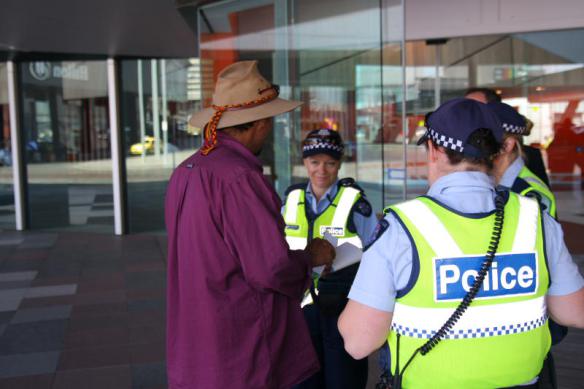
By contrast:
It was mid-afternoon before the elders and supporters re-emerged:
`

Though Uncle Kevin and a few others had left earlier:Tully McIntyre of FoE and Tomohiro Matsuoka of JFP gave reports on what had been happening, followed by Uncle Kevin Buzzacott:
By all accounts reception of the traditional owners’ concerns was rude and dismissive, and this applied also to a visitor from Chile, Cristian Milla Curiñanco, here at the invitation of LASNET, who attempted to raise the matter of BHP Billiton’s record in his country (see video at end of this report).
`
More photos from the protest:
`


`
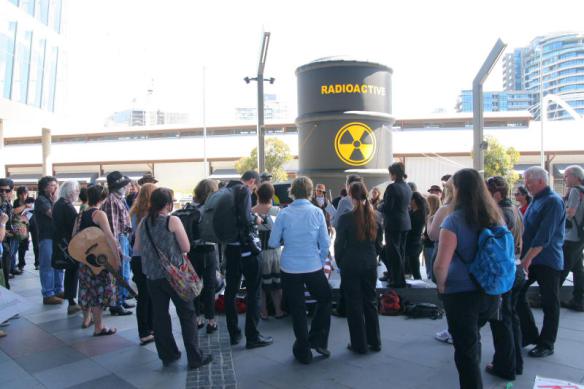
`


`
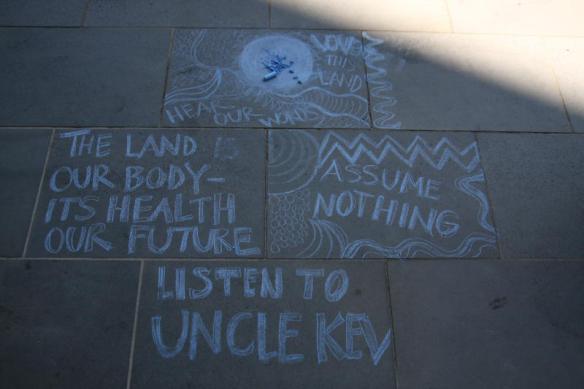
`
More of Uncle Kevin:
`


`


`
Protesters and elders line up at the end:
`

`
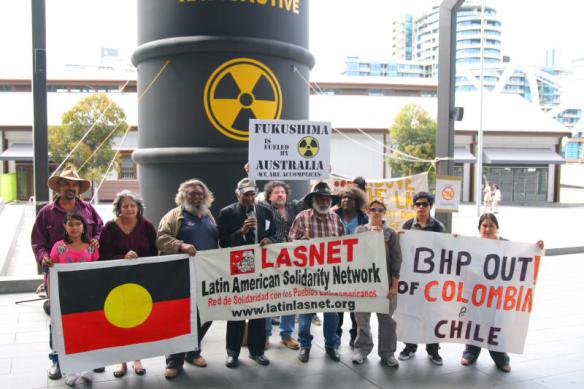
………………………………
The previous evening, Friends of the Earth’s ACE Collective organised a public forum at Trades Hall with traditional owners and campaigners including Dave Sweeney of ACF and Mia Pepper from CCWA – see details on Facebook for this event. The forum was recorded and extracts are in preparation. The following is an address by Chilean activist Cristian Milla Curiñanco, who spoke in Spanish, here interpreted by Lucho Riquelme of LASNET:
`
`
Another speaker was Arrernte activist, artist and writer Mitch from Alice Springs:
`
`
Darcy Harris from Western Australia:
`
`
Mia Pepper from the Conservation Council of Western Australia (CCWA) spoke about what has been happening in Western Australia and introduced the new BHP Alternative Annual Report, which was due to be distributed to shareholders at the AGM next day:
‘
Going Backwards under Baillieu – protest at Parliament House, Melbourne, 13 November 2011
Environmentalists gathered at Parliament House to protest at the Baillieu government’s retrogressive policies, symbolised by a backwards march down Spring Street to the Treasury Gardens, where they were welcomed by members of Occupy Melbourne. Before setting off, they heard speakers including Mark Wakeham of Environment Victoria, one of the groups organising the event, along with the Victorian National Parks Association, The Wilderness Society, and Friends of the Earth; Kate Tubbs, Bacchus Marsh teacher and farmer defending her farm from coal-mining;Luke Chamberlain, Victorian Forest Campaigner, The Wilderness Society; Cam Walker, Campaigns Coordinator, Friends of the Earth; and Matt Ruchel, Executive Director, Victorian National Parks Association. There is a report by Takver on Melbourne Indymedia and photos on the FoE Flickr Photostream. See also http://www.melbourne.foe.org.au/?q=node/1024 and http://www.environmentvictoria.org.au/media/backwards-march-urges-baillieu-government-change-direction-environment
Mark Wakeham began proceedings by listing the ‘shocking decisions’ the Baillieu government
had made, inviting the rally to ‘vote’ by boos to select the worst. The list ranged form the return of cows to the Alpine National Park, support and approval for the new HRL coal-fired power station, through extending the duck hunting season, logging the habitat of endangered species, imposing crippling restrictions on the building of wind farms, and so on and so on. See further http://www.environmentvictoria.org.au/blog/posts/baillieu-government
Kate Tubbs recounted how there had been no objections to the mining exploration at Bacchus Marsh, simply because no-one in the are had known anything about it: “There are 29000 people in the Moorabool shire, and not one person objected against this exploration licence, because we did not know it was happening… The stealth stunned us. I was the first one to find out because they actually needed to come on to our land and I had refused…” (See article in The Age and Moorabool environment group website)
Cam Walker discussed the government’s wrecking of the wind energy program in Victoria. Wind energy was one of ‘only two so-called environment policies which the Coalition had brought to the last election, and they had implemented it in its entirety, which was entirely bad news for Victoria. He saw it as clearly based on political deals and ideology and not on common sense, not on good science and certainly not on best practice management of anything. (There is a detailed analysis of the implications of the Baillieu government’s wind energy policies on the FoE website – What is the real cost of Ted Baillieu’s wind energy policy? ) He was loudly applauded when he said that under the Baillieu government’s policies we would have no more community wind farms, and for his own part, he would rather a community cooperative owned his energy and sold it to him rather than International Power down at Hazlewood…
Matt Ruchel stressed Victoria’s unique richness in terrestrial and marine species ‘but it’s also one of the most stressed places in Australia’. Many scientific reports over the last 20 years had shown that Victoria had a high number of threatened species, with very little native vegetation left compared with other places around the country. ‘But what we’ve seen in the last 12 months is a real concerning trend – the first act almost of the Baillieu government when they came to power was to essentially sneak cattle back into the Alpine National Park in January last year’ [subsequently blocked by the federal government]. He went on to list massive expansion into the green Wedges -‘the lungs of Melbourne, but also some of the last remaining areas of grassland, the most endangered ecosystem in the country’ with as little as 1% left; attacks on the national parks, emending red gum legislation and abolishing the ban on collecting firewood. See further http://www.abc.net.au/news/2011-09-22/anger-over-firewood-collection-plan/2911004 and generally on the VPNA website.
Luke Chamberlain dealt with the government’s record in the forests: ‘About two months ago .. the Baillieu state government, through its logging apparatus VicForests, sent the bulldozers into Leadbeater’s [possum] habitat (http://leadbeaters.org.au/)and started trashing the forest at Sylvia Creek outside Toolangi (loud boos). (See eg report in Green Left Weekly). These forests, he said, were special, they were the last home for a myriad of endangered species, this particular area was one the small amount of forest that did not get burnt during the 2009 fires … See more on the website of the Wilderness society and here.
Excerpts from the speeches on YouTube:
Occupy Melbourne Ctd – Saturday, 12 November 2011 at Treasury Gardens

The first General Assembly since the injunction hearings – see reports on OMDigest and Raili Simojoki’s blog – followed the erection of three ‘not-tents’ including one housing a new Indigenous Embassy. Council officers backed by a small number of police duly arrived and warned that a compliance notice would be issued if the ‘structures’ were not removed within first 30, then 45 minutes – later further extended as the subsequent discussion at the GA continued. When they did move in there was standoff, from which they sensibly enough retreated. The GA then continued, and was still in session when the last of the following photos was taken, around 6pm. By this time a number of motions had been voted upon, among which was agreement to defend the Indigenous Embassy against any further attempts to remove it. At time of writing, the latest word from OM on Twitter is that people were settling down for a night under the stars…
`

`

`
Robbie Thorpe spoke at the start of the first session of the GA, announcing the establishment of the Embassy and inviting OM participants to furnish themselves with Aboriginal Passports, amongst other things as a defence against the imposition of jurisdiction that Indigenous Australians did not recognise:
There was a steady stream of applicants:

`
The GA in session:

`
The council arrives:

`
Negotiation:

‘
Some time later, the council officers returned with more police, some equipped with cameras, and as we said before, there was a standoff of some minutes before an official retreat:

`

`
Expressions of victory:
`

`
The council and police withdraw:

`
Followed by the Aboriginal flag:
`

`
Conference of council and police:
`

……….
The GA resumed, and resolved to defend the Embassy:

`
This was the position at 6pm.
Some more from the afternoon:
`

`

`

Updates should be sought on the Occupy Melbourne website and related social media, as well as Melbourne Indymedia [14 nov – there is a detailed account of the GA plus ongoing discussion on Melbourne Indymedia here]:
http://occupymelbourne.org/
http://www.facebook.com/occupymelb?sk=wall
http://twitter.com/#!/occupymelbourne
http://omdigest.org/
http://indymedia.org.au/melbourne
“Towers of Power” – OM tours Melbourne CBD, 5 November 2011
BHP Billiton’s head office in Melbourne was one of the stops on a ‘sight-seeing’ tour of Melbourne organised by Occupy Melbourne under the title “Towers of Power of the Corporate 1%”. Starting at the City Square, site of a violent eviction by police on Friday 21 October, the tour took in buildings that had been the subject of union ‘Green bans’ – not forgetting the Regent Theatre itself, which borders the Square – starting with 333 Collins Street and the ANZ bank building on the corner of Collins and Queen Streets – as well as BHP and the offices of Australia Post (currently imposing new work practices – see http://waverley-leader.whereilive.com.au/news/story/australia-post-dispute-set-to-escalate-in-mt-waverley/. The tour ended back at the City Square in time for the 14th General Assembly …
Tour guide throughout was long-time unionist Dave Kerin, and Victoria Police provided a generous escort.
See also:
How Public is Melbourne’s City Square?
Rescuing the Regent Theatre – Louise Blake
bhpbilliton – undermining the future
`
Photos from the tour and start of 14th General Assembly:
“Refugees are Welcome Here!” – Rally 5 November 2011
The Refugee Action Collective (Victoria)organised a rally and march reiterating demands for an end to mandatory detention and offshore processing. This came in the wake of two events: the High Court decision ruling the government’s intended Malaysia deal illegal, and the drowning deaths of asylum seekers off the coast of Java a few days previously. Among the speakers at the State Library were Mahendra Kusumawardan, refugee activist from Indonesia, and Aran Mylvaganam, a refugee from Sri Lanka. Others included Sister Brigid Arthur of the Brigidine Asylum Seekers’ Project, Kate Jeffery of Labor for Refugees, Louise Newman of the Alliance of Health Professionals for Asylum Seekers, and Jody Betzien of the AMWU. After these speeches at the State Library the rally moved down Swanston Street to Federation Square to hear from Berhan Ahmed of the Greens and Hazara refugee Mukhtar Naza,who read a poem in memory of the 23 Hazaras massacred in Quetta, Pakistan, in September last (see rally report here).
.
From the rally at the State Library:
.
Members of The Conch played before the rally –

.

`
Daniella Olea, who shared MC duties with Lauren Ireland of RAC-Vic –
Aran Mylvaganam, himself a refugee from Sri Lanka (see article linked to above), spoke of the recent suicide of “Shooty” in Villawood Detention Centre (see report here) before going on to call for an end to mandatory detention and the unlocking of detention centres. He called on those present to cry out for justice, since the victims themselves could not…
There followed a minute’s silence in memory of “Shooty”.
`

Sister Brigid suggested that the present was a watershed, though acknowledging that there had been many disappointments before. But perhaps now, for the first time since the Tampa, there was a chance things could improve since following the High Court ruling neither of the two main political parties could send asylum seekers offshore for processing, and the government was now talking about onshore processing and community detention. She, too, called for community pressure. She saw hope in the issue of more bridging visas and the ‘trickle’ out of the detention centres into the community: community detention was working and the sky had not fallen in. She mentioned cases she had personal knowledge of where people who had been suicidal, had attempted suicide, had been transformed after release, despite a level of ongoing anxiety while their visa status was undetermined. But she warned that all this could be undone by the media spreading poison, such as the lies spread about money payments to asylum seekers. It was essential to object to these claims. She also stressed the need to make refugees welcome, not least by help with housing.
Sister Brigid also drew attention to the plight of those affected by adverse ASIO assessments – there was injustice in the fact that they were not allowed to know why they had been rejected, and had no right of appeal.
A further point was the emphasis on combating people smuggling – she saw this as a distraction from the main issue of the treatment of the asylum seekers once here. Nothing would stop people trying to reach Australia. They knew the risks, and this alone was proof of their overwhelming need to escape their present plight.
`

Jody Betzien of the AMWU thanked people for coming. He saw it as essential to protest at every instance of injustice, and now twenty years after the ALP introduced mandatory detention it was an absolute disgrace that it was necessary to campaign against it. It was obvious that people would keep coming to Australia by boat as long as there were refugee camps in SE Asia. His union, the AMWU, was a union of migrants: many new arrivals over the years had been shunted into low paid manual jobs and their unions had fought to win better apy and conditions for them. So it was natural for the union to pledge its support not just for half-measures like releasing only children but a complete dismantling of the whole policy. He ended with a reminder of the union war cry: Dare to struggle, dare to win! If you don’t fight, you lose.
`

Dr Louise Newman, who besides being the convenor of the Alliance of Health Professionals for asylum seekers also sits on an Immigration Department advisory panel on mental health (see for example here), saw the present situation as an ‘absolute disaster’ as regards the mental health of people in detention. She said the government had been repeatedly advised that detention centres should not be places for the treatment of mental illness. She herself was still treating people she had first met as children in Woomera or Baxter ten years ago – ‘broken human beings’. She insisted that health professionals had an ethical obligation to speak out. Services provided in the centres were wholly inadequate, but even if a thousand or two thousand more staff were provided, the situation would bit mend, because the cause of the problem would still be there. It could not be fixed. There were at least two attempted suicided every day, and SERCO (the company that runs the detention centres) staff were now issued with knives specifically for cutting down detainees who had tried to hang themselves. So far there had been six successful attempts, and this was just the beginning. And yet the government did not seem interested in listening to its own independent advisory group.
`

Indonesian activist Mahendra Kusumawardan addressed the question of why people keep getting on the boats in spite of the repeated drownings. What they wanted was simple: a better life for themselves and their children. He blamed the ruling class in Indonesia and Australia for imposing its own solution – Australia was ‘offshoring’ responsibility to Indonesia for stopping the boats and building detention centres. Half the population of Indonesia was living in poverty; they don’t want prisons. Detention in Indonesia was not a humane solution: asylum seekers were subject to torture, beatings and blackmail. It was necessary to fight by building solidarity between people, as exemplified in the Occupy Wall Street movement worldwide. After a hundred years of [colonial] occupation what Indonesia needed was schools, not detention centres, the dreams of the 99%, not of the 1%.
`

Final speaker at the Library was Kate Jeffrey of Labor for Refugees. She reminded the rally of the upcoming ALP National Conference in Sydney on December 4th, where refugee activists plan protests – see for example here and here. She said many in the ALP shared concerns about mandatory detention, and that treatment of asylum seekers should be seen as a humanitarian issue not a political one as the parties were treating it. She argued that it was necessary to work withing the system or nothing would change. Offshore processing and mandatory detention contravened the ALP platform, and there was hypocrisy in the claims by both parties to be concerned about mental health issues [while maintaining a policy of mandatory detention].
`
There are more photos from the rally and march in the gallery below.
`
At Federation Square there were two final speakers: Berhan Ahmed of the Greens and Mukhtar Naza.

Berhan Ahmed, himself a refugee from Eritrea, accused politicians of degrading refugees, denying their humanity. He said on the contrary that refugees had brought riches to this country and should be treated with respect. Criminals in other countries had dehumanised them, and were they to be dehumanised here also? He pointed out that the Greens, of whom he was a member, were the only party with a humane policy. Australia was faced with only a tiny percentage of the world’s asylum seekers, and there was no need to see them as a security issue: security is exactly what refugees are seeking, and they are determined to make the country safe, not the contrary. He asked the question, if we in Australia do not treat refugees with respect, how can we expect other countries to do so? Talk of security was scaremongering…
`

Last to speak was Iranian refugee Mukhtar Naza, introduced by Lauren as someone she had visited while he was in detention. He read his own poem occasioned by the recent massacre of Hazaras in Quetta (see reference above).
`
At the end of the rally many made their way back up Swanston Street to the City Centre for the start of a ‘Towers of Power’ tour organised by Occupy Melbourne, of which a report will shortly be found on this site…
`




